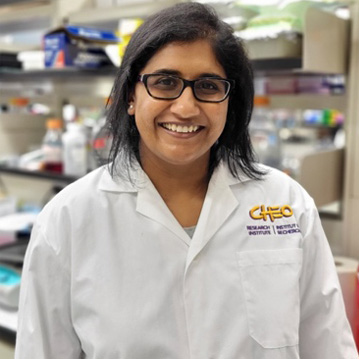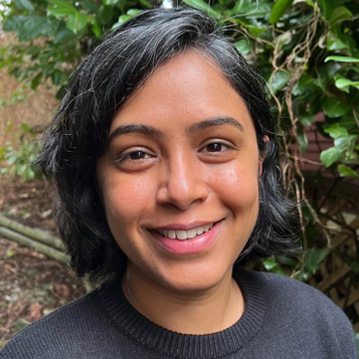Recipients of the Rare and Eye Diseases Pools – CIHR REDI Early Career Transition Award
The CIHR REDI Early Career Transition Award supports highly qualified post-doctoral researchers, clinicians, and PhD-holding research associates from underrepresented groups to help them launch their research faculty careers in Canada. This transition award has two phases across a maximum of 6 years to increase independence and support the transition of successful applicants to independent research careers.
Dr. Neena Lala-Tabbert, Postdoctoral Fellow, Children’s Hospital of Eastern Ontario Research Institute (CHEO RI)

“I hope that my research can provide novel therapeutic targets that can be used in drug development to improve the efficiency of gene- and cell-based therapies and thus improve the quality of life for Duchenne muscular dystrophy patients.”
Dr. Neena Lala-Tabbert is a Postdoctoral Fellow at the Children’s Hospital of Eastern Ontario Research Institute (CHEO RI). Her research stems from her fascination with how a small number of muscle stem cells can repair damaged skeletal muscle. Problems in these cells’ function can lead to debilitating muscle disorders.
Dr. Lala-Tabbert’s research focuses on understanding the role of the alternative NF-kB signalling pathway and its interaction with the classical NF-kB pathway in muscle regeneration and diseases such as Duchenne muscular dystrophy (DMD). The NF-kB pathways are critical for normal skeletal muscle function and play a role in recovery following muscle injury. By using cell culture techniques and mouse models, her research aims to identify NF-κB signalling targets for the treatment of DMD and other muscle diseases to improve muscle function in patients.
Dr. Indhu Shree Rajan Babu, Research Associate, University of British Columbia

“My research focuses on promoting equitable access to cutting-edge diagnostics for rare genetic neurodevelopmental disorders, aiming to make a significant impact on the health care system and improve how we approach the diagnosis and management of these disorders.”
Dr. Indhu Shree Rajan Babu, a research associate at the University of British Columbia, is focused on developing and validating advanced genetic tests and computational methods to improve diagnostic precision for patients with rare neurodevelopmental disorders. Her goal is to facilitate the integration of these innovations into clinical practice. Dr. Rajan Babu’s interest in human genetics and molecular diagnostics began early in her career, driven by a fascination with the ethical complexities and immense potential of genetic testing to provide answers for patients and their families. The challenge of making advanced genetic tests universally accessible and the opportunity to significantly improve patient outcomes continue to inspire her work.
Approximately 3-4% of children in Canada are affected by neurodevelopmental disorders, requiring lifelong clinical support and care. Families often face years of consultations and unnecessary tests to find a diagnosis, with many never receiving a clear answer. This long diagnostic journey causes significant stress and socio-economic strain on patients and families, and may miss critical developmental windows when early treatment interventions can be most effective. Rapid identification of precise genetic alterations is crucial for effective and timely treatment.
Dr. Rajan Babu’s research aims to improve genetic testing for these disorders. By utilizing advanced sequencing technologies and computational tools, her work seeks to detect previously unidentifiable genetic mutations. This approach will improve diagnostic accuracy, provide quicker answers to families, and pave the way for new treatment developments. She finds great fulfillment in seeing how her research makes a tangible difference in the lives of patients and families, helping them connect with support groups and guiding them toward effective interventions.
Dr. Pamela S. Lagali, Postdoctoral Research Associate, Ottawa Hospital Research Institute

“I hope that through my work I can help to inform Canadians about the critical need that we have for continuing and new research that aims to better understand what can cause retinal degeneration and how we might be able to develop new approaches to treat it.”
Dr. Pamela Lagali is a Postdoctoral Research Associate at the Ottawa Hospital Research Institute. Her research builds on years of studies in retina biology and human visual system diseases. Motivated to understand the basic biology of visual processes and develop new treatments, her research focuses on retinal degenerative diseases such as macular degeneration and retinitis pigmentosa, which cause vision loss. These diseases are caused by the loss of photoreceptor cells, which sense light and initiate the process of vision, affecting an increasing number of individuals globally. Most current therapies only manage symptoms and slow damage rather than preventing or reversing vision loss.
Her project aims to use a unique mouse model to study the cellular and molecular mechanisms behind photoreceptor cell and vision loss. This model mimics the progression of human retinal diseases and can be used to explore the genes involved, identify molecules that promote photoreceptor cell health, and study how physical exercise could protect photoreceptors and improve visual function. This model’s preliminary findings suggest some retinal defects may be preventable or reversible, offering hope for new therapeutic strategies for promoting retinal cell survival and vision health.
- Date modified: